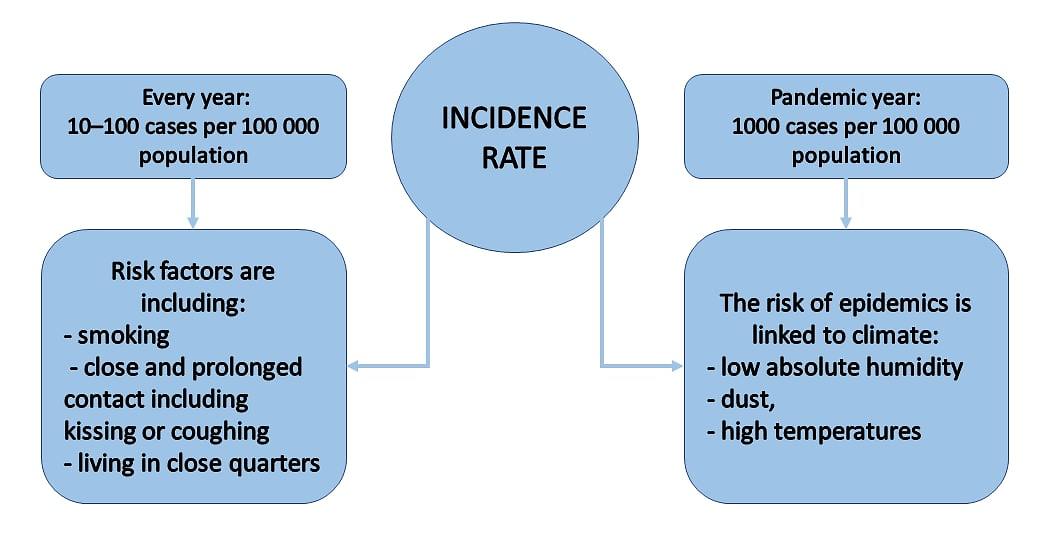CASE REPORT
Meningococcal meningitis in a young adult – case report and literature review
1
Student Research Group, Second Department of Anaesthesiology and Intensive Therapy, Medical University, Lublin, Poland
2
Second Department of Anaesthesiology and Intensive Therapy, Medical University, Lublin, Poland
Corresponding author
Natalia Biedroń
Student Research Group of the Second Department of Anaesthesiology and Intensive Therapy, Medical University of Lublin, Poland
Student Research Group of the Second Department of Anaesthesiology and Intensive Therapy, Medical University of Lublin, Poland
J Pre Clin Clin Res. 2023;17(1):19-22
KEYWORDS
TOPICS
ABSTRACT
Meningococcal meningitis is an inflammation of the meninges caused by Neisseria meningitidis. Clinically, meningococcal meningitis does not differ from other bacterial meningitis. Initially, the symptoms of the disease may be non-specific, such as fever, muscle pain, and weakness, only later do the symptoms typical of meningitis appear. Adolescents and adults have a lower incidence of neck stiffness and altered consciousness than younger patients. The disease is characterized by a rapid onset and progression of symptoms within a few hours. The detection of Neisseria meningitidis in the cerebrospinal fluid allows for the correct diagnosis and appropriate treatment. Antibiotics reduce mortality in meningococcal disease by up to five times. The case is presented of a young adult patient with a history of viral meningitis in childhood who was hospitalized for severe meningococcal meningitis and successfully treated.
Biedron N, Paluch Z, Borys M. Meningococcal meningitis in a young adult- case report and literature review. J Pre-Clin Clin Res. 2023; 17(1): 19–22. doi: 10.26444/jpccr/161678
REFERENCES (20)
1.
Yadav S, Rammohan G. Meningococcal Meningitis. StatPearls Publishing. https://www.ncbi.nlm.nih.gov/b... (access: 2022.12.28).
2.
Stephens DS, Greenwood B, Brandtzaeg P. Epidemic meningitis, meningococcaemia, and Neisseria meningitidis. Lancet. 2007; 369(9580):2196–2210. https://doi.org/10.1016/S0140-....
3.
World Health Organisation. Meningococcal meningitis. https://www.who.int/news-room/... (access: 2022.12.28).
4.
Siddiqui JA, Ameer MA, Gulick PG. Meningococcemia. StatPearls Publishing. https://www.ncbi.nlm.nih.gov/b... (access: 2023.01.02).
5.
Wang B, Santoreneos R, Giles L, et al. Case fatality rates of invasive meningococcal disease by serogroup and age: A systematic review and meta-analysis. Vaccine. 2019;37(21):2768–2782. https://doi.org/10.1016/j.vacc....
6.
Pizza M, Bekkat-Berkani R, Rappuoli R. Vaccines against Meningococcal Diseases. Microorganisms. 2020;8(10):1521. https://doi.org/10.3390/microo....
7.
Chaudhuri A, Martinez-Martin P, Kennedy PG, et al. EFNS Task Force. EFNS guideline on the management of community-acquired bacterial meningitis: report of an EFNS Task Force on acute bacterial meningitis in older children and adults. Eur J Neurol. 2008;15(7):649–59. https://doi.org/10.1111/j.1468....
8.
Young N, Thomas M. Meningitis in adults: diagnosis and management. Intern Med J. 2018;48(11):1294–1307. https://doi.org/10.1111/imj.14....
9.
Davis LE. Acute Bacterial Meningitis. Continuum (Minneap Minn). 2018; 24(5, Neuroinfectious Disease):1264–1283. https://doi.org/10.1212/CON.00....
10.
Bosis S, Mayer A, Esposito S. Meningococcal disease in childhood: epidemiology, clinical features and prevention. J Prev Med Hyg. 2015; 56(3):E121–4.
11.
Dwilow R, Fanella S. Invasive meningococcal disease in the 21st century-an update for the clinician. Curr Neurol Neurosci Rep. 2015;15(3):2. https://doi.org/10.1007/s11910....
12.
Fitzgerald D, Waterer GW. Invasive Pneumococcal and Meningococcal Disease. Infect Dis Clin North Am. 2019;33(4):1125–1141. https://doi.org/10.1016/j.idc.....
13.
Vaz LE. Meningococcal Disease. Pediatr Rev. 2017;38(4):158–169. https://doi.org/10.1542/pir.20....
14.
Hollingshead S, Tang CM. An Overview of Neisseria meningitidis. Methods Mol Biol. 2019;1969:1–16. https://doi.org/10.1007/978-1-....
15.
Mrozowska-Nyckowska K, Zbrzeźniak J, Paradowska-Stankiewicz I. Meningitis and encephalitis in Poland in 2020. Przegl Epidemiol. 2022; 76(3):371–384. https://doi.org/10.32394/pe.76....
16.
Mörs K, Braun O, Wagner N, et. al. Influence of gender on systemic IL-6 levels, complication rates and outcome after major trauma. Immunobiology. 2016;221(8):904–10. doi:10.1016/j.imbio.2016.03.005.
17.
Caugant DA, Brynildsrud OB. Neisseria meningitidis: using genomics to understand diversity, evolution and pathogenesis. Nat Rev Microbiol. 2020;18(2):84–96. https://doi.org/10.1038/s41579....
18.
Nadel S. Treatment of Meningococcal Disease. Journal of Adolescent Health. 2016;59(2):S21–S28. https://doi.org/10.1016/j.jado....
19.
Cabellos C, Pelegri´n I, Benavent E, et al. Invasive meningococcal disease: impact of short course therapy. A DOOR/RADAR study. J Infect. 2017;75:420–425.
20.
Tolaj I, Dreshaj S, Qehaja E, et al. Dexamethasone as adjuvant therapy in the treatment of invasive meningococcal diseases. Med Arh. 2010; 64(4):228–30.
Share
RELATED ARTICLE
We process personal data collected when visiting the website. The function of obtaining information about users and their behavior is carried out by voluntarily entered information in forms and saving cookies in end devices. Data, including cookies, are used to provide services, improve the user experience and to analyze the traffic in accordance with the Privacy policy. Data are also collected and processed by Google Analytics tool (more).
You can change cookies settings in your browser. Restricted use of cookies in the browser configuration may affect some functionalities of the website.
You can change cookies settings in your browser. Restricted use of cookies in the browser configuration may affect some functionalities of the website.


